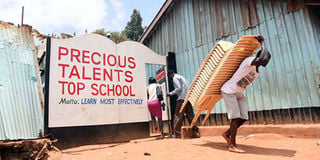Closure of informal schools to lock out 2m pupils: Lobbies

Precious Talents Top School in Nairobi was shut down by Education Cabinet Secretary George Magoha on September 26, 2019 following the death of eight pupils. Several informal schools have been condemned. PHOTO | FILE | NATION MEDIA GROUP
What you need to know:
- The owners of informal schools want the ministry to halt the closures and county education boards to complete the registration of schools that have met the criteria.
- The government funds private schools in informal urban settlements of Nairobi, Mombasa, Kisumu, Nakuru, Thika, Eldoret and Kitale in a move to ensure that all learners have access to education.
Owners of informal schools across the country have protested the decision by the government to shut down their institutions, warning that about two million learners are at risk of staying out of school.
They termed the government's decision to close schools after the death of eight pupils at Precious Talents Top School in Nairobi’s Dagoretti South reactionary.
Last week, Education Principal Secretary Belio Kipsang directed education officials to close down all unregistered schools.
Interior Principal Secretary Karanja Kibicho has since given county commissioners two weeks to submit reports on closure of schools.
Three associations that support informal schools termed Dr Kibicho's directive "an emotive reaction to a terrible tragedy — which is understandable — but not a good basis for making effective policy decisions".
FAULTY DECISION
In a statement signed by Allan Juma Masika, chairman of Kenya Alliance of Non-Formal Schools Welfare Association, Charles Ochieng’ of Kenya Independent Schools Association and Charles Ouma of Complementary Schools Association of Kenya, the lobbies regretted that the ministry's directive will lead to the closure of up to 20,000 schools and lock out children from marginalised communities who attend them.
“The directive is a 'one size fits all' approach and makes no distinction between schools that are already partway through registration and those that have not engaged at all. Government officials are not making a distinction between safe semi-permanent schools and unsafe schools,” they said.
They added: “We appreciate that there are ongoing challenges in the basic education sector, which need to be resolved. These challenges have been exacerbated by decade-long consultations and policy discussions on a registration pathway for the sector."
STATE FUNDING
The owners of informal schools want the ministry to halt the closures and county education boards to complete the registration of schools that have met the criteria.
Kenya National Union of Teachers (Knut) Secretary-General Wilson Sossion has supported the government's decision to shut down the institutions.
These institutions are registered under alternative Provision of Basic Education and Training, and the policy has been in place since 2016.
Under the National Council for Nomadic Education in Kenya, the government funds private schools in informal urban settlements of Nairobi, Mombasa, Kisumu, Nakuru, Thika, Eldoret and Kitale in a move to ensure that all learners have access to education.
Each learner receives a capitation of Sh1,420 per year. According to former Nairobi County Education executive Janet Muthoni, there is need to establish more schools in the country.
SHORTAGE
She said for close to 20 years, there has been no building of new primary schools in the county due to grabbing of public land.
Ms Muthoni added that there are only 205 public primary schools in Nairobi, which serves only a third of the school-going children.
“We have about 10 wards in Nairobi that have no single public primary school, and this is what had made many private schools to come up in those areas,” said Ms Muthoni.





